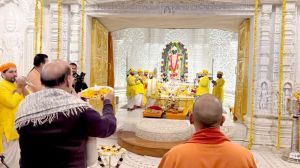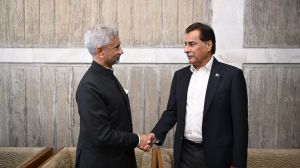Voters146; obligations
There is a lively coverage on TV channels of the forthcoming elections in Maharashtra. Yet there is general voter apathy, especially in the ...

There is a lively coverage on TV channels of the forthcoming elections in Maharashtra. Yet there is general voter apathy, especially in the urban areas. The prevailing mood is that elections do not make any real difference to the lives of the people and voting is a waste of time and energy. This is an unfortunate trend. The vital importance of democratic elections was eloquently expressed by Winston Churchill when he said: 8216;8216;At the bottom of all tributes paid to democracy is the little man walking into a little booth with a little pencil, making a little cross on a little bit of paper.8217;8217;
The foremost obligation of a citizen in a democracy is the exercise of his right of franchise with a full sense of responsibility. Votes should not be given on the basis of the caste or religion of the candidate but only on the individual8217;s merit, his character. To cast votes for candidates who enjoy a well-deserved reputation for corruption and wrongdoing is an affront to democracy. It is a citizen8217;s ethical obligation to reject such candidates and especially to spurn well-known defectors, because defection is the worst form of political immorality.
We have an anti-defection law, but its working has been far from satisfactory. The main reason is that the person who adjudges disqualification of a legislator on the ground of defection is the Speaker. Unfortunately, the suggestion that after a person is appointed a Speaker, he must snap all connections with the political party to which he belongs and which supported his candidature as a Speaker has not found acceptance. My experience of the working of anti-defection law in different states has been that the Speakers do not generally possess the requisite impartiality and independence expected of them. The proposal that the power of disqualification under the Tenth Schedule should be entrusted to the Election Commission is a salutary one and should be implemented at the earliest.
We swear by our democracy and pride ourselves on being the largest democracy in the world. But if citizens abdicate their responsibility by refusing to vote or to reject candidates who have a colourful criminal record and a sordid background, then we should not bemoan that law-breakers have become lawmakers in our Parliament and state legislatures. It must be remembered that a genuine democracy entails certain obligations on the part of the citizens, and one of them is the duty to vote. In some regional and national constitutions, the duty to vote is expressly mentioned. Regrettably, it is absent in the list of fundamental duties mentioned in Article 51-A of our Constitution.
One of the important recommendations of the National Commission to Review the Working of the Constitution is that the duty to vote at elections and actively participate in the democratic process of governance should be made a fundamental duty in our Constitution. If voters do not perform this duty, then our legislatures and Parliament will be filled with people whose description was vividly given by Sri Aurobindo, who said: 8216;8216;We have as an average politician a person who does not represent the people or its aspirations. What he does usually represent is all the average pettiness, selfishness, egoism, self-deception, and these he represents well enough, as well as a great deal of mental incompetence, and conventionality, timidity and pretence. Great issues often come to him for decision. But he doesn8217;t deal with them greatly. Noble ideas are on his lips but they become rapidly the trap of a party.8217;8217; And the blame will lie squarely on the voters.
Jazz musicians and freedom
There are several memorable statements about freedom. The most celebrated is Franklin Roosevelt8217;s speech in January 1941 about Four Freedoms, in which he included freedom of speech and expression, freedom to worship God in one8217;s own way, freedom from want and freedom from fear.
What is a jazz musician8217;s conception of freedom? Duke Ellington, one of the greatest and most prolific jazz musicians, visited India in 1963 with his big band, which included greats like Johnny Hodges, Cat Anderson, Jimmy Hamilton and Paul Gonsalves. The band performed in Delhi and in Bombay. It was a thrilling and an unforgettable musical experience. In 1969, Duke was awarded by President Nixon the nation8217;s highest civilian honour, the Presidential Medal of Freedom. In his response, Ellington mentioned the four freedoms that his brilliant arranger and composer Billy Strayhorn lived by, namely, 8216;8216;freedom from hate unconditionally; freedom from self-pity; freedom from fear of possibly doing something that may help someone else more than it would him; and freedom from the kind of pride that can make a man feel that he is better than his brother8217;8217;. That was indeed Billy Strayhorn8217;s best composition and exposition of freedom in day-to-day life.
- 01
- 02
- 03
- 04
- 05































